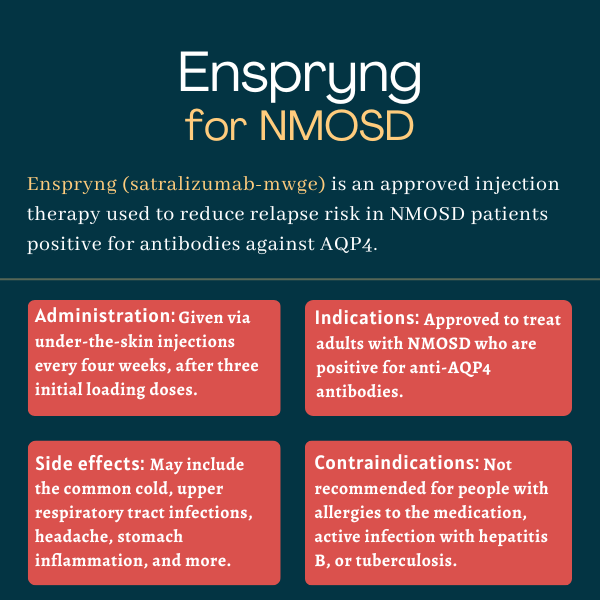
FAQs about Enspryng
The potential interaction between Enspryng and alcohol has not been thoroughly investigated, and clinical trials testing the therapy excluded patients with a recent history of alcohol abuse. It’s known that Enspryng can cause liver damage, and drinking alcohol, especially in large quantities, also can damage the liver; therefore, it’s recommended that patients talk to their healthcare team about whether it is safe for them to drink alcohol while taking Enspryng.
Enspryng has not been rigorously studied in pregnant people. In studies done in pregnant monkeys, the therapy did not cause developmental problems, but animals were born with impaired immune function. Patients should talk with their doctor about any plans for being pregnant while on the therapy. A registry is collecting data on patients exposed to Enspryng during pregnancy; it can be contacted at 1-833-277-9338.
Hair loss has not been reported as a side effect of Enspryng in clinical trials. However, several patients experienced a meaningful increase in weight while on treatment. It is recommended that patients speak with their healthcare team if they experience any unanticipated side effects during Enspryng treatment.
In the trials that supported the therapy’s approval, a pronounced difference in terms of the proportion of relapse-free patients between the Enspryng and placebo groups was evident after about one year. But because each person can respond differently to a medication, patients are advised to talk with their healthcare team on how the therapy may help in their particular case.
The U.S. Food and Drug Administration (FDA) approved Enspryng in August 2020 as a treatment for adults with neuromyelitis optica spectrum disorder (NMOSD) who are positive for antibodies against aquaporin-4, the most common type of disease-driving antibody. The medication became the first subcutaneous, or under-the-skin, treatment approved for NMOSD.
Related articles
 Fact-checked by
Fact-checked by 



